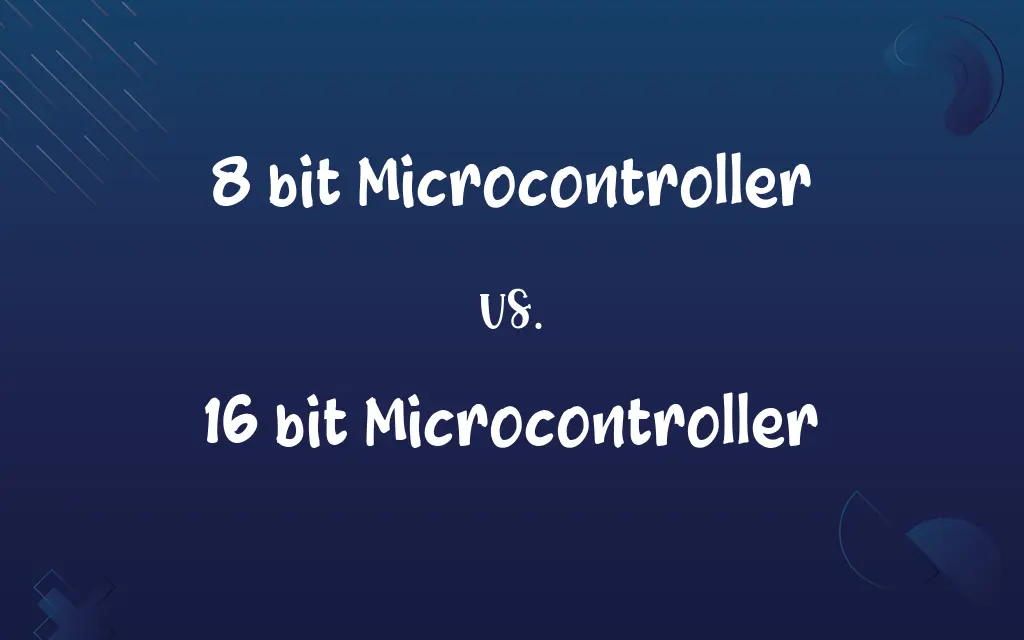8 bit Microcontroller vs. 16 bit Microcontroller: Know the Difference

By Shumaila Saeed || Updated on December 25, 2023
An 8-bit microcontroller processes 8 bits of data at a time, suitable for simpler tasks, while a 16-bit microcontroller handles 16 bits, offering greater speed and efficiency for complex operations.

Key Differences
An 8-bit microcontroller is designed for basic control applications, processing data in 8-bit chunks, making it cost-effective for simple tasks. In contrast, a 16-bit microcontroller processes data in 16-bit chunks, providing better performance for more data-intensive tasks.
Shumaila Saeed
Nov 19, 2023
The 8-bit microcontroller typically has a smaller memory footprint, suitable for applications with limited space and memory requirements. Meanwhile, a 16-bit microcontroller, with its larger data bus, can handle more complex applications requiring more memory and computational power.
Shumaila Saeed
Nov 19, 2023
In terms of power consumption, 8-bit microcontrollers are generally more power-efficient, ideal for battery-powered or energy-sensitive applications. On the other hand, 16-bit microcontrollers, while more power-hungry, offer greater processing capabilities and speed.
Shumaila Saeed
Nov 19, 2023
The programming complexity of an 8-bit microcontroller is usually lower, making it a good choice for beginners or simple embedded systems. The 16-bit microcontroller, with its advanced capabilities, often requires more sophisticated programming skills.
Shumaila Saeed
Nov 19, 2023
For cost-sensitive projects, the 8-bit microcontroller is often the more economical choice due to its simpler architecture. In contrast, the 16-bit microcontroller, while more expensive, provides greater value in applications where higher processing power is essential.
Shumaila Saeed
Nov 19, 2023
ADVERTISEMENT
Comparison Chart
Data Processing
Processes data in 8-bit chunks
Processes data in 16-bit chunks
Shumaila Saeed
Nov 19, 2023
Memory Capacity
Suitable for limited memory requirements
Better for complex applications with more memory needs
Shumaila Saeed
Nov 19, 2023
Programming Complexity
Easier, suitable for basic applications
Requires more advanced programming skills
Shumaila Saeed
Nov 19, 2023
ADVERTISEMENT
8 bit Microcontroller and 16 bit Microcontroller Definitions
8 bit Microcontroller
Known for its low power consumption, ideal for battery-operated devices.
The remote control's 8-bit microcontroller ensured a long battery life.
Shumaila Saeed
Nov 10, 2023
16 bit Microcontroller
A 16-bit microcontroller handles more complex tasks with its higher processing capability.
The robot's advanced functions were controlled by a 16-bit microcontroller.
Shumaila Saeed
Nov 10, 2023
8 bit Microcontroller
It operates with 8-bit data units, making it suitable for basic embedded systems.
An 8-bit microcontroller was used in the old gaming console for its simplicity.
Shumaila Saeed
Nov 10, 2023
16 bit Microcontroller
It processes data in 16-bit units, allowing for more efficient computation.
For the medical device, a 16-bit microcontroller was chosen for its precision.
Shumaila Saeed
Nov 10, 2023
8 bit Microcontroller
8-bit microcontrollers are cost-effective, often used in consumer electronics.
Most kitchen appliances use an 8-bit microcontroller due to its cost-efficiency.
Shumaila Saeed
Nov 10, 2023
ADVERTISEMENT
16 bit Microcontroller
More expensive than 8-bit counterparts, but provides enhanced performance.
The 16-bit microcontroller was a worthwhile investment for the high-performance security system.
Shumaila Saeed
Nov 10, 2023
8 bit Microcontroller
They are characterized by a simpler architecture and programming model.
Beginners often start learning with an 8-bit microcontroller due to its straightforward design.
Shumaila Saeed
Nov 10, 2023
16 bit Microcontroller
Typically requires more sophisticated programming due to its complexity.
Developing the autonomous drone required programming skills specific to 16-bit microcontrollers.
Shumaila Saeed
Nov 10, 2023
8 bit Microcontroller
An 8-bit microcontroller is a compact processor designed for simple control tasks.
The 8-bit microcontroller efficiently managed the home automation system.
Shumaila Saeed
Nov 10, 2023
16 bit Microcontroller
Offers greater memory capacity, suitable for applications requiring extensive data processing.
The 16-bit microcontroller was essential for the data-intensive weather monitoring system.
Shumaila Saeed
Nov 10, 2023
Repeatedly Asked Queries
What are the advantages of a 16-bit microcontroller?
It offers greater processing power and memory capacity for complex applications.
Shumaila Saeed
Nov 19, 2023
Can a 16-bit microcontroller handle more data than an 8-bit?
Yes, it can process larger data chunks more efficiently.
Shumaila Saeed
Nov 19, 2023
Do 16-bit microcontrollers consume more power?
Typically, yes, due to their higher processing capabilities.
Shumaila Saeed
Nov 19, 2023
Are 8-bit microcontrollers still relevant?
Yes, for cost-sensitive and low-power applications.
Shumaila Saeed
Nov 19, 2023
Is programming a 16-bit microcontroller more complex?
Yes, it often requires more advanced skills.
Shumaila Saeed
Nov 19, 2023
Is upgrading from an 8-bit to a 16-bit microcontroller common?
Yes, especially when upgrading the functionality or performance of a device.
Shumaila Saeed
Nov 19, 2023
What is an 8-bit microcontroller used for?
It's used for simple control tasks in devices like remote controls and basic appliances.
Shumaila Saeed
Nov 19, 2023
What kind of applications use 16-bit microcontrollers?
Applications like advanced robotics, medical devices, and complex automation systems.
Shumaila Saeed
Nov 19, 2023
Can 8-bit microcontrollers support IoT devices?
They can, but with limitations in complexity and data handling.
Shumaila Saeed
Nov 19, 2023
What makes a 16-bit microcontroller more expensive?
Its complex architecture and enhanced capabilities.
Shumaila Saeed
Nov 19, 2023
Is an 8-bit microcontroller cheaper than a 16-bit?
Yes, generally due to its simpler architecture.
Shumaila Saeed
Nov 19, 2023
Are 8-bit microcontrollers suitable for beginner programmers?
Yes, due to their simplicity and ease of use.
Shumaila Saeed
Nov 19, 2023
Do 16-bit microcontrollers offer better multitasking capabilities?
Yes, due to their higher processing power and memory.
Shumaila Saeed
Nov 19, 2023
Do 16-bit microcontrollers require more memory?
Yes, they typically support larger memory capacities.
Shumaila Saeed
Nov 19, 2023
Are 8-bit microcontrollers less efficient than 16-bit ones?
In terms of processing power, yes, but they are more power-efficient.
Shumaila Saeed
Nov 19, 2023
Are 8-bit microcontrollers becoming obsolete?
Not entirely, as they still have applications where their limitations are acceptable.
Shumaila Saeed
Nov 19, 2023
What future developments are expected in 16-bit microcontrollers?
Continued advancements in processing efficiency, memory capacity, and integration with emerging technologies.
Shumaila Saeed
Nov 19, 2023
How does the instruction set differ between 8-bit and 16-bit microcontrollers?
16-bit microcontrollers usually have a more complex instruction set for advanced operations.
Shumaila Saeed
Nov 19, 2023
Can I replace an 8-bit microcontroller with a 16-bit one in a device?
It's possible but may require significant modifications to the device and software.
Shumaila Saeed
Nov 19, 2023
Is there a big market for 8-bit microcontrollers?
Yes, especially in consumer electronics and simple embedded systems.
Shumaila Saeed
Nov 19, 2023
Share this page
Link for your blog / website
HTML
Link to share via messenger
About Author
Written by
Shumaila SaeedShumaila Saeed, an expert content creator with 6 years of experience, specializes in distilling complex topics into easily digestible comparisons, shining a light on the nuances that both inform and educate readers with clarity and accuracy.








































































